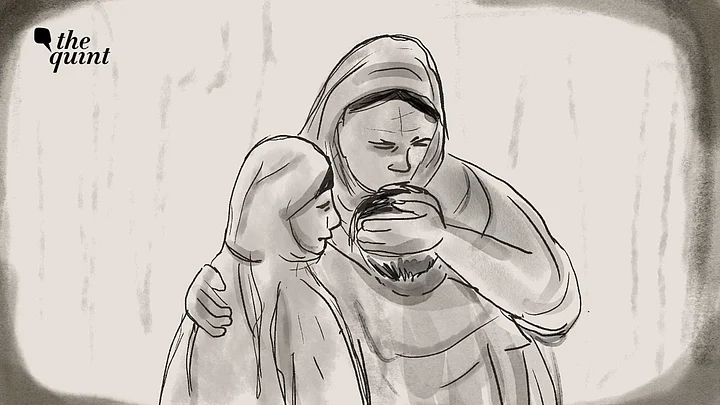“My husband was killed, and I was informed over a phone call. I heard screams and crying. My legs and hands were weak. At first I thought it was a joke, and then I was in a shock,” recalls Fawzia Wahdat, a prominent Afghan journalist.
Fawzia’s 29-year-old husband and well-known television journalist Hamid Seighani was killed in a bus bombing on 13 November 2021, 90 days after the Taliban took control of Afghanistan.
Although ISIS-K claimed responsibility for a series of bomb attacks that shook Hazara-dominated areas around Kabul, Fawzia alleges that the Taliban murdered her husband.
“After the collapse of Kabul on 15 August last year, I continued my job as a news anchor at a television network with the same kinds of clothes that I had before the Taliban takeover. I started my fight for freedom of speech, women’s rights, and protested on the streets of Kabul. The Taliban warned me against protesting. They said I'll lose my job and will be punished by death.”Fawzia Wahdat to The Quint
Fawzia reveals that despite threats to her life, she continued working but feared for the lives of her loved ones, especially her husband and their eight-year-old daughter Neda.
“I noticed that strangers were following me, and a few days later, on 13 November, they killed my husband. After his death, I was in mourning for 20 days and was fired for taking excessive leaves. I’m sure my employers were pressured by the Taliban. They later admitted that our strength doesn’t reach the power Taliban has,” Fawzia adds.
'Single Mothers, Widows Hit Hard by Loss of Jobs'
After months of living in fear, and losing her husband, Fawzia decided to escape Kabul. On 20 December 2021, along with her daughter, she left her country and moved to Pakistan for a safer future. However, life hasn’t been easy since she fled.
She continues to organise protests in Islamabad, in a bid to bring back global attention towards the plight of Afghan women. She hopes the international community will help Afghan women, who have not only lost their loved ones but also their jobs.
According to an estimate by the United Nations, nearly 20 million people – at least half of the population – are facing acute hunger. Starvation continues to be one the biggest issues in the conflict-ridden country, yet the Taliban refuses to let women join the workforce, pushing single mothers and widows of former soldiers, government officials, and activists into poverty.
'Have Been Hiding for a Year'
Speaking to The Quint about how the Taliban killed her first husband in 1999, and tortured her second husband a few months ago, Gul (name changed to protect identity), says:
“In 1999, the Taliban murdered my husband. I still don’t know why. I picked up the pieces of my life for the future of my children. I educated myself and started working as a teacher. However, tragedy struck my family again when the Taliban killed my son in Kunduz in 2016. When the Taliban retook Kabul on 15 August, my brother-in-law feared for my life. Widowed women in Afghanistan fear the Taliban will take them as their wives. To avoid this, my husband’s brother married me few months ago and days later my home was ransacked and my spouse was taken by the Taliban. He was beaten and tortured. They blamed him for secretly helping out women by supplying sewing materials to them to earn a livelihood.”
Gul is a mother of five and teacher from Kabul, struggling to earn a living for her family – in the backdrop of worsening economic crisis in Afghanistan.
She alleges that the Taliban continues to threaten her children and her family for raising their voices against the regressive laws of the regime.
She narrated how the Taliban attacked her school when they entered Kabul, killed the guard, and have been chasing her and other women activists for the past year.
“I have been in hiding for a year and I fear some day they will find me because I fight for human rights and for the rights of the women of my country. Until then I will fight for freedom.”
One Year On, Women Continue To Fight for Jobs
For the past 12 months, Afghan women have taken to the streets to protest against Taliban’s regressive laws. However, the regime has neither allowed women back in the workforce nor has it reopened schools for teenage girls.
To mark one year of “losing their freedom,” protests have been planned throughout the week, with excessive force being levelled by the Taliban to stop women from protesting.
On 13 August, a group of 50 women protested in the capital demanding “work, bread and freedom.” Minutes after they started the protest, Taliban opened fire on these women and arrested some of them.
Basira, one of the protesters, tells The Quint, “After they dispersed us with gunfire, I managed to run. Our group has been separated to run for safety. However, some of us have been detained and some are being followed.”
Speaking about how women have been fighting without giving up, Fawzia says:
“We Afghanistan’s women are role models for women across the world to always stand up against the oppression of tyranny and inequality and defend their rights and those of their gender. We ask all women to stand by the women of Afghanistan and defend our rights.”
(The author is an independent journalist based out of Paris. She is an alumna of University College Dublin and writes about international conflict and war.)
(This was first published on 16 August 2022. It has been republished from The Quint's archives in the run-up to International Women's Day on 8 March.)
(At The Quint, we question everything. Play an active role in shaping our journalism by becoming a member today.)
